#Literary theory
Explore tagged Tumblr posts
Text
monster theory reading list
this list is going to be some recommended reading when it relates to literary teratology or monster theory. some of these works predate 'monster theory' as a concept (which was coined in 1996 by jeffrey jerome cohen) but are foundational to that work regardless.
i'll try to include links to any readings that are freely available online and links to doi etc but if something isn't and you're really keen, hit me up and y'know we'll see what i can do.
monster theory: reading culture (1996) by jeffrey jerome cohen - the original and defining text on monster theory by the man himself. here is a link to a pdf of the first chapter, which i spoke about at length in another post.
the horror reader (2000) by ken gelder (editor) - an incredibly insightful collected edition about the horror genre as a whole, however gelder's introduction to part three, as well as marie-hélene huet's chapter introduction to monstrous imagination were incredibly helpful to my work personally. very generously, gelder has allowed free access to the entire work in pdf form!
the monster theory reader (2020) by jeffrey andrew weinstock - an amazing collected edition featuring cohen, creed, kristeva and a number of others that provides a really good foundational background knowledge of what contributed to the creation of monster theory as well as some fantastic takes on it post cohen.
classic readings on monster theory (2018) by asa simon mittman & marcus hensel - similar to weinstock, this collected edition features a number of classical foundational essays and some more modern ones surrounding monster theory. a very helpful starting point! here is a link to the introductory chapter by mittman and hensel in pdf form!
the monstrous feminine: film, feminism, psychoanalysis (1993) by barbara creed - creed's idea of the monstrous feminine is one of the foundational underpinnings of monster theory and is key in comprehending the 'other' as monstrous, particularly as it relates to women in a patriarchal society. highly recommend! here is the entire book in pdf form!
powers of horror: an essay on abjection (1982) by julia kristeva - kristeva's idea of abjection is a precursor to a lot of theoretical frameworks regarding the horror genre, in particular as a direct precursor to creed's work, then to cohen's work. here is the entire book in pdf form!
this is definitely not an all encompassing list of sources, but it is a good starting point for anyone interested in this particular niche field of literary theory. these are texts that were crucial for me in understanding the basics when i was starting work on my thesis.
#monsteracademia#monster theory#jeffrey jerome cohen#barbara creed#julia kristeva#ken gelder#jeffrey andrew weinstock#literary theory#literary teratology#monster theory 101
404 notes
·
View notes
Text
Y'all wanna know about a gender-non-conforming knight from 13th century France? No? That's okay- I'm fine with talking to myself.
I'm obsessed with gender performativity in early medieval texts- so obviously I had to know everything about Le Roman De Silence.
To preface-
So, long before there was the Marvel Cinematic Universe- there was the interconnected works of the Arthurian Legends. The original superheroes- King Arthur, Merlin, Morganna le Fey, and the rest of the cast. However, one of the lesser known (only arguably canonical) interconnected texts of the Arthurian legend hails from France. People argue over whether or not to include these texts as part of the cannon of King Arthur because it's technically french- and the french-english divide between characterization of all the main players of Arthur's court is remarkably different. Much research on this suggests the discrepancy of characterization is largely due to distance between where the stories originate, and sociopolitical tensions between the French and the English. Either people were too far apart to share stories- thus too far apart to keep characterization uniform, or they fucking hated each other enough to mess up the characterization on purpose. For example, many of the French portrayals of King Arthur paint him to be a rather terrible person, where English portrayals are generally more kind to him.
All that aside- many people will disagree that Le Roman de Silence should even be part of the Arthurian legend canon anyway- because it only mentions Merlin at the end of the poem and because it's a super french poem.
The main storyline is about this character named Silence. From the Old French Poem- Le Roman de Silence.
Gender? No- Never heard of it.
The latter half of the story in this poem is predicated on a complex mediation of Nature vs Nurture. What happens is that a baby is born into a wealthy family, and for sociopolitical reasons, the family decides to raise the girl baby as a boy. They name this child "silence." Silence grows up with full access to an education, as was typical for the boy children of aristocratic medieval families- this education becomes important later as Silence wrestle with where they fit into the larger social structure after maturing into adulthood. Essentially, they find the idea of marriage too boring and would like to be a Knight or Explorer instead. (I love them.) Anyway, it's fascinating to me that the conceptual ideas of nature and nurture are personified into being something like "deities" which are overseeing the growth of Silence through the ages- and so we get these deities commentary.
Silence wants to be a knight- so Nurture brags about being right that gender is more performative than it is biological. Then, later Silence grows up to be remarkably "pretty" and according to the deity of Nature- they brag about being right that biology and gender are intrinsically tied. It's such a thought-provoking mediation on gender as either performance or pure biology that I forget it was written in the 13th century- long before Freud or Lacan or any of the others who became hyper fixated on human presumption of gender as either a social category or a biological necessity.
I argued in a paper, once, that the narrative itself does actually finally end on the note that Gender is a performance, and it is tied into social roles only so the ruling class can have control of the population. That is why the stories ending shifts into horror-genre-esque of Silence marrying into the upper-ruling class.
I also have a strong urge to write a Fanfiction of Silence as a knight- who does not meet a sad fate but rather lives happily as a knight and eventually marries a princess. Okay- Okay? fine I said it. I said it-
Social pressure to marry?
The story takes a dark turn, however- when the King demands Silence to reveal themselves in front of the court. Obviously, even the author of the story was aware that misogynistic social standards would not allow for people to ever really be free of gender stereotypes and roles. So, Silence is then forced out of the adventurous lifestyle of a knight and into a marriage. Also, this is the place in the story where Merlin makes an appearance (I have a theory that Merlin is representative of the devil, and the author really hated that all AFAB people were forced into marriage back in 1200's. So that's why the devil shows up when all the bad shit is happening to Silence).
Inevitability and dismay-
What I find particularly interesting about this poem is the fact that the end, as Silence is forced into marriage and back into "proper" social roles for their assumed biological characteristics, is the fact that it is written like an early attempt at gothic horror!
So, one of the stipulations for something being a "gothic horror" is 1.) old, archaic, twisted buildings. (this blog is indeed named after my fixation with gothic horror elements, it's interplay relation to social reform, as its emphasis on decay as the tonal necessity for social indemnification). Anyway, the other most important aspect of gothic horror- is an overwhelming sense of desolation, isolation, and loneliness.
Sure, Silence is forced into marriage- but even with the forthright writing style of the author, we, as readers, are struck by Silence's loneliness. Thus, the "happily ever after" part of the storyline wherein the characters get married, as it traditional to chivalric romance, is recriminated against in subtext. Now, we have a moment in which the "happily ever after" is a creation of horror rather than peace.
Ending the narrative with marriage as equivalent to a loss of freedom and a sense of evermore-present loneliness, cumulating in the edifice of horror-struck fear in Silence at their own new future, is a remarkably bold social statement coming from a 13th century author.
I just think it's a really interesting text on the thematic points of negotiating Gender identity, in broader terms of performance and social roles, as much as it is a critique on the total social control that the monarchy held over the people of 13th century France.
Edit: I need to add that Silence themselves consistently rejects the idea that they are AFAB and instead only ever refers to themselves as "Silence" or "the knight"
#le roman de silence#medieval literature#13th century#manuscript#nature vs nurture#traditional gender roles#gender roles#france#french literature#french poetry#classic literature#academia#dark academia#gothic horror#marvel cinematic universe#king arthur#merlin#arthurian legend#arthurian mythology#arthurian literature#knight#medieval knight#gender#agender#nonbinary#chivalry#romantic literature#literary criticism#literary theory#poetry
334 notes
·
View notes
Text
GUYS, I FIGURED OUT THE BLACK TURTLES!
It's a detail of OTGW that's lowkey perplexed me since the series first aired. What's with the black turtles that appear in every episode? What role do they serve in the story, and what do they represent?

A small, seemingly inconsequential detail, but just the sort to occupy my mind every time I watch the show.
My first train of thought: Are they manifestations of The Beast's power and influence? If not, why does eating one turn Beatrice's dog into a slavering monster? But if so, why is Auntie Whispers purely benevolent despite eating one (and presumably much more)? Why aren't they themselves monstrous and malevolent? But also why aren't they, on the contrary, beautiful and benevolent? They're just ... sorta there, which suggests there's no supernatural nor moral element to them. Yet they're clearly not natural turtles, either ...
My second train of thpught: Are they representations of the Unknown's liminal nature, moving between land and water just as the Unknown is between life and death? Thus a foreshadow and a reminder of the brother's state? It would sorta make sense, given their omnipresence. Mirrored by the brother's Frog, whose amphibious nature is likewise liminal. And the weirdness of turtles specifically for this symbolic role fits the the weird aesthetic of The Unknown. Still, it didn't seem to quite fit.
BUT TONIGHT, I FIGURED OUT WHERE THEY COME FROM! THE OLD GRIST MILL!
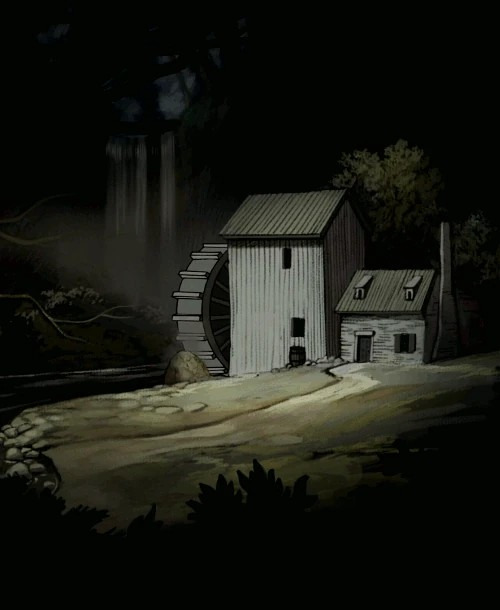
WHERE THE WOODSMAN HAS BEEN GRINDING EDELWOOD TREES INTO A DISTINCTIVELY BLACK OIL FOR THE LANTERN!
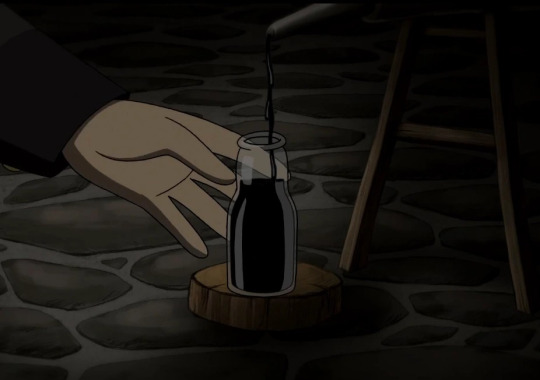
SOME OF WHICH MUST BE WASHED OFF, LEAKING, OR EVEN SPILLED OUTRIGHT INTO THE STREAM THAT POWERS THE MILL, AND THUS CONTAMINATING THE ENVIRONMENT!
It's pollution. Industrial Revolution era pollution is the reason for the black turtles distinctive color and weird effects on some people, but not others.
#over the garden wall#otgw#turtle#pollution#environment#literary analysis#critical analysis#literary theory
427 notes
·
View notes
Text
Analysis on: The Executions of Danganronpa V3: Kaede Akamatsu

Good god this took me literal hours!
Anyway to sort of jumpstart my new blog, A NEW THEORY FOR YOU ALL! That's right, I'm dropping the UnweavingLies professional shtick and being absolutely batshit insane.
I'm just kidding xD The theory itself is (mostly) serious, I'm just so brain dead from working on it for so long today that I'm gonna just fall over now.
Anyway, enjoy!
#Kaede Akamatsu#danganronpa#new danganronpa v3 killing harmony#drv3#Character Analysis#Meta Analysis#Literary Theory#Character Study#literary criticism#Execution Analysis#Der Flohwalzer#Read the TW tags on Ao3 please
44 notes
·
View notes
Text
“She is full of Theory. The Theories are worse than the Furies.”
—Flannery O’Connor, in a 1962 letter to William Sessions
57 notes
·
View notes
Text
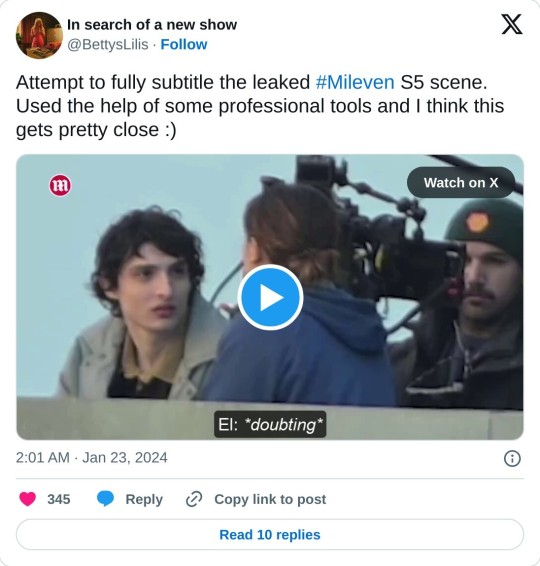
this is how the motivation is byler endgame. okay so this the theory.
1
the "you have to improve your motivation" is obviously about how mike is depressed & needs to improve his own motivation for coming out. & he's just pulling a will byers right here & projecting his feelings onto el.
2
the local village. guys we need to stop supporting this local village agenda because obviously the party doesnt return to the local village because they've seen too much. want to know why??? because the local village is HOMOPHOBIC. & that's why they don't go back.
3
the beautiful land with the waterfalls. as yonta explained in my chat, water is H^2 O. Yknow what that spells? hoo. not hoe, hoo which is exactly ONE letter off from homo. also three waterfalls? do you know what else has three sides? a triangle. yknow what symbol can represent gay people? a triangle. a PINK triangle. yknow what the heart is? red & pink is a shade of red giuys. mike is the heart, the heart CAN be pink, pink tirangle, triangle three sides, three waterfalls canon. & then el asks if thats possible & mike thinks that she might be on to him so he has to retract about the gay. but dont worry,, we all know what this really means.
#byler#stranger things#will byers#mike wheeler#byler headcanons#stranger things 5#st5#st5 spoilers#st5 production#st5 leaks#byler theory#byler analysis#byler proof#byler endgame#true#relatable#real things#lip sync#lip reading#literary theory
191 notes
·
View notes
Text
The Secret History and Queer Theory
The male characters' relationships with eachother in The Secret History relate to Queer Theory through their actions and participation in the bacchanalia, bar Richard since he was not invited to that ritual. In the novel, the only openly queer character is Francis, who sleeps with Charles whenever Charles is drunk enough to be open to it, kisses Richard, and kisses Camilla, the only female in the class. When discussing the bacchanalia with Richard, Henry deflects from prodding that part of the ritual is sexual and tends to have orgies; this hints that during the night in the woods, Henry, Charles, Camilla, and Francis slept together. Richard also accidentally stumbles upon a moment between Henry and their professor, Julian, when they share a short kiss, which seems to mirror the intense relationships between male teachers and their pupils in ancient Greece. Richard’s sexuality can also be questioned since, although he pines after Camilla, he gives a lot more vivid details of the appearances and personalities of his male peers and seems to obsess over Henry. In the book, Richard adores Camilla, who looks androgynous and is like her brother. When he and Francis kiss, they stop because Charles shows up in Richards's room.
Queer Theory relates best to this novel because the characters tend not to follow the heteronormative ways of Western society. At one point or another in the story, the boys seemingly sleep with or kiss each other, and we see Richard being more observant of the other's looks than what would be considered “normal.” Gender studies would also work by breaking down how The Greek students fit their respective gender roles in society. Henry, for example, is described as tall, handsome, and strong but also has a temper. In contrast, Camilla is seen as androgynous yet still dainty and intelligent. Near the novel's end, Camilla takes on the caretaker role for her elderly aunts once she leaves Hampton.
Throughout my first reading of the novel, I noticed so many moments that did not seem heteronormative and how they seemed to mirror parts of ancient Greek society—those moments to me added humanity to people who otherwise were held up on a pedestal by Richard. Although the sexuality of the characters is never stated, bar Francis, it shows a depth to each character that they may not be entirely one sexuality or another. The Greek students, besides Bunny, seemed to see themselves as people or gods from ancient Greece, or at least, they wished to be like them.
#the secret history#book discussion#queer theory#richard papen#francis abernathy#charles macaulay#camilla macaulay#henry winter#personal take#dark academia#donna tartt#literary theory
30 notes
·
View notes
Text
I really want to do my next re-read of the hunger games series in light of that one seminar I took during my masters about dystopian literature. It was actually more of a literary theory class and we didn't discuss THG bc the professor was a bigoted old man, but the themes were there.
#the whole thing about plutarch and the importance of books in a dictatorship and all that#literary theory#thg#the hunger games#sotr#sotr spoilers#sunrise on the reaping#sunrise on the reaping spoilers
25 notes
·
View notes
Text

*Chekov, but still, very handy.
37 notes
·
View notes
Text
SUBSTACK ALERT
On today's substack, I discuss Donna Tartt's 1992 classic campus thriller The Secret History, the Pandora's Box of the dark academia genre, what it means for a modern-day novel to be "pretentious", the art of storytelling, and some Russian Formalist style literary criticism, via the concept of defamiliarization. I also speak of the current publishing trends of building books around aesthetic subcultures as gimmicks, and why not much in publishing feels sincere anymore.
My kofi: papenathys
[ author's note: this essay is purely my subjective opinion, and is not meant as a bashing of anybody's literary tastes, but if someone on tumblr insists to you that I'm a hateful literary snob, believe that shit and leave me alone! ]
#mimiwrites#essays#essay#literary criticism#lit crit#dark academia#literary theory#anti intellectualism#anti capitalism#publishing#representation#the secret history#tsh#richard papen#donna tartt#books#classics#literature#litblr#studyblr#literary history#history#on writing#book review#tropes#anti booktok
102 notes
·
View notes
Text
Taylor Swift is Derivative nonsense, not intellectually placed allusions. I'll die on this hill, and I have many more examples beyond just the one listed below.
Let’s talk about the difference between being derivative and utilizing allusion in text. :)
I’ve seen a lot of defenses for Taylor Swift’s work that hinges on the theoretical concept of intertextuality. People don’t often know that they are arguing over the validity (or emotional impact) of intertextual cessions in Swift’s writing, but they are.
Intertextuality, if you don’t already know, is a set of determinable interwoven texts that all correspond on a particular thematic point. This encompasses, but is not limited to, the literary device of allusion.
There are many examples of intertextual works, since it is intrinsically post-modern. Yet, I want to talk about how Taylor Swift attempts allusions that only ever fall into flat-facing derivative blandness. I want to talk about how, yes, Swift is in the spirit of the age; yet her work devolves into derivative insincerity simply because she is not an artistic writer.
Now, for an egregiously bad allusion. (I think it’s worse because Romeo and Juliet is my favorite Shakespeare play). In “The Albatross” Swift writes, “A rose by any other name is a scandal” in which the obvious allusion is to Shakespeare's, “A Rose by any other name would smell as sweet” from the play Romeo and Juliet. The line in the play is often misquoted, so perhaps Swift is just ignorant, however the line means to draw attention to the fact that names are just words the that do not actually dictate the internal nature of someone.
The full line, from Shakespeare, reads “O be some other name/ What’s in a name? That which we call a rose/ by any other name would smell as sweet;/ So Romeo would, were he not Romeo call’d” (Romeo and Juliet). Thus, Juliet is lamenting the full divisive way in which her family is at odds with Romeo’s family; upon deeper consideration too, Juliet is modulating how social pressures, often outside our control particularly in youth, can impact and modify the discourse between reality, doing what is proper in accordance with the majority, and intrinsic human desire to fulfill our own needs. So, the line is not only explaining how Romeo and Juliet cannot be together overtly due to familial dispute, but in the same words it explains the full breadth of social dissertation for the pursuit of individual need. Afterall, he would still be Romeo "were he not Romeo call'd." Juliet is admitting that she would still love him with or without the constraint of social obligation due the environment, or family, in which we are born; thus, we can see how individually human desire can be placed at odds with the demands of mainstream society.
This is a nuanced conversation when considering it through moral theory. For instance, we often talk about how people should not go against the mainstream for immoral pursuit of individual desire and that is reasonable; yet herein Shakespeare's work the thematic point is on the morality of love and desire to go against social convention. Shakespeare is saying, "Love is a greater moral good than that of social obligation to follow tradition and to hate who you are trained to hate based on parental teaching." It's a genius fucking line, in a genius fucking play. Now, we all know how the play ends, the lovers run off together, they have a brief day in the sun. However, social pressure and adult obligation catch up to them again and thus they die for it. They die for their courage to love and to go against the mainstream.
Let’s return to Taylor Swift, the human embodiment of mainstream social pressure, as she writes that "a rose by any name is a scandal." As such, she is saying that all roses everywhere are just a scandal waiting to happen. If everything is a scandal, rather than speaking to any nuance grief to the pervasiveness' of social pressure to adhere to mainstream. Swift is simply throwing petulance to the world, by saying “Rose by any other name is a scandal” she limits what a rose could be, or become in using the verb “is” to fully solidify a rose as a scandal; which is a message that is diametrically opposed to the thematic point Shakespeare is making with his line. For Swift, there is no redemption, no nuance, and there is no subtext in which implicit messaging lay to tell people that going against the mainstream might just be the last thing you ever do but God is it worth it. To live with that brief day in the sun. And die for courage. Swift is just saying the opposite and stating that the mainstream is inevitable- there is no use in fighting it. A name is a name. It remains to tell the rose exactly what it is. Swift lacks imagination.
I would argue that Swift does make obvious attempts at allusion in her work, yet it is so poorly done because she does not actually see or use the thematic point of the source material from which she pulls her allusions. For allusions, to be done in an artistic impactful manner, we must keep to the thematic point of the source material. When the allusion is done correctly there is a “layering” effect in literature that redoubles the overarching themes of human experience in a way that calls us from the past, Shakespeare, to the present. Thus, is the theory of intertextuality in literary works.
(I made that bold because it's the main point of this, and I don't want anyone to miss it).
Taylor Swift’s work here simply does not measure up to anything artistic, thoughtful, or well-done. It is simply derivative of Shakespeare, but I don't think it qualifies as a true allusion.
#anti taylor swift#the tortured poets department#ex swiftie#ttpd#shakespeare#romeo and juliet#philosophy#moral theory#literary theory#literary criticism#english lit student#the albatross
214 notes
·
View notes
Text

Some shelves in my new place.
#russian literature#literature#literary theory#literary criticism#philosophy#philosophy of art#philosophy of literature#art#bookshelves#books
165 notes
·
View notes
Text
quick question to the lit majors/scholars:
what comes after postmodernism? is it metamodernism or something else? if so, what are the recurring narrative styles/genres that sets it apart from postmodernism?
welp.
pls share this with your well-read friends who might know the answer. i wanna know everyone’s opinions.
#literature#english lit studyblr#studyblr#study blog#literature memes#english lit memes#english lit student#lit major#literary criticism#english literature#literary theory#literary fiction#english#postmodernism#metamodernism#lit#real academia#academia#art academia#literature major#phdblr#phd life#phdjourney#phd research#phd student#phd thesis help#phd adventures#phd candidate#phd guidance#phd studyblr
30 notes
·
View notes
Note
yooooo love ur blog!!! thought i'd ask bc i didn't know if there was a way to search: do you have any recommended reading? definitely interested in theory, but also movies/shows/etc that have stood out to you/that you've had fun analyzing in your studies! basically....hi can i have Your Dream Syllabus Reading List
Well hi there! I'm glad you enjoy my blog.
I have my monster theory 101 reading list here in a post that goes into a bit more detail about why those particular readings. But there are definitely some other readings that I personally have really enjoyed and that have been really helpful to me. So here's a list of theory stuff that wasn't included in the 101 reading list;
Undead (A Zombie Oriented Ontology) by Jeffrey Jerome Cohen
Maternal Horror Film: Melodrama and Motherhood by Sarah Arnold
Birth Traumas: Parturition and Horror in "Rosemary's Baby" by Lucy Fischer
Monstrous imagination by Marie-Helene Huet
Ex(or)cising the spirit of Japan: Ringu, The Ring and the persistence of Japan by Nicholas Holm
Posthuman Teratology by Patricia MacCormack
Evil Children in Film and Literature by Karen J Renner
Well-Travelled Female Avengers: The Transcultural Potential of Japanese Ghosts by Elisabeth Scherer
The Birth of the Clinic and the Advent of Reproduction: Pregnancy, Pathology and the Medical Gaze in Modernity by J Shaw
There's probably a lot more but these are ones that I remember very clearly and that made a real lasting impression on me.
In terms of fiction texts that stand out to me for their monstrous potential or that I've had a lot of fun analysing in my work;
Ringu (1998) and The Ring (2002)
Splice (2009)
Interview with the Vampire (1994)
Let The Right One In (2008)
Brightburn (2019)
Sinister (2012)
The Exorcist (1973)
Resident Evil Biohazard (2017)
Prometheus (2012)
Alien Covenant (2017)
Alien Resurrection (1997)
Like all of the Alien Franchise really but those three in particular. Even if I'm still upset that Alien Romulus came out after the cut off date for texts for my thesis and my supervisor won't let me include it because it is a Masterpiece
Dead Space (especially the recent remake holy shit I love the idea of decay as an extant form of life)
Not technically a movie or a show or any form of traditional media but I highly enjoy and recommend The Mystery Fleshpit National Park also
24 notes
·
View notes
Text

from the shelf [002/???]: eros the bittersweet, anne carson
#eros the bittersweet#anne carson#literary theory#english literature#classic literature#bookblr#desire#satisfy my hunger#on love#from the shelf#franz kafka#joan didion#light academia#jeanette winterson#letters to milena#literature#quotes#literary fiction#literary analysis#literary criticism#litblr
104 notes
·
View notes
Text
Aesthetic Emotions and the Catharsis of Tragedy
How I feel after watching Jimin's Production Diary - The Truth Untold.
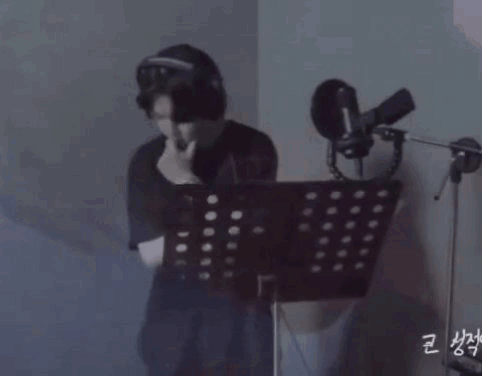
Why do we feel so drawn to emotional outpouring of others?
Why does the suffering and pain of artists make 'meaningful' art'?
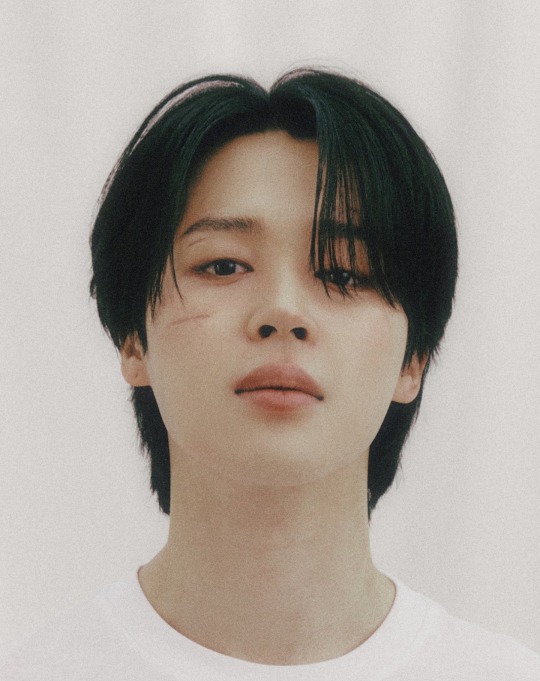
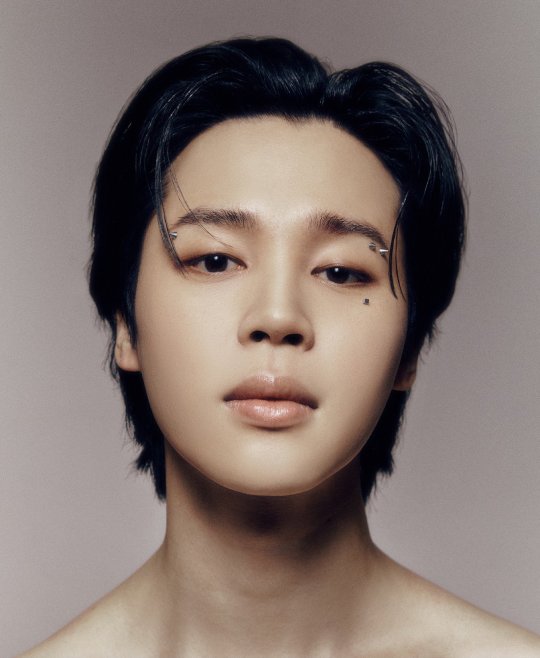
I'm going to tell you why I think Face is a Greek Tragedy and why, even though the album is a complete and perfect story, we still needed Letter.
You know how sometimes you just need a good cry? And afterwards you feel better, like a weight has lifted... that's catharsis.
Based on the philosophy of the ancient greek philosopers Aristotle and Plato, the catharsis offered by tragedy in art is good for your soul.
The tragedy I'm talking about is not like a natural disaster. Its not like an unfathomably sad real life situation such as war, or the failure of the referendum for The Voice to pass in Australia.
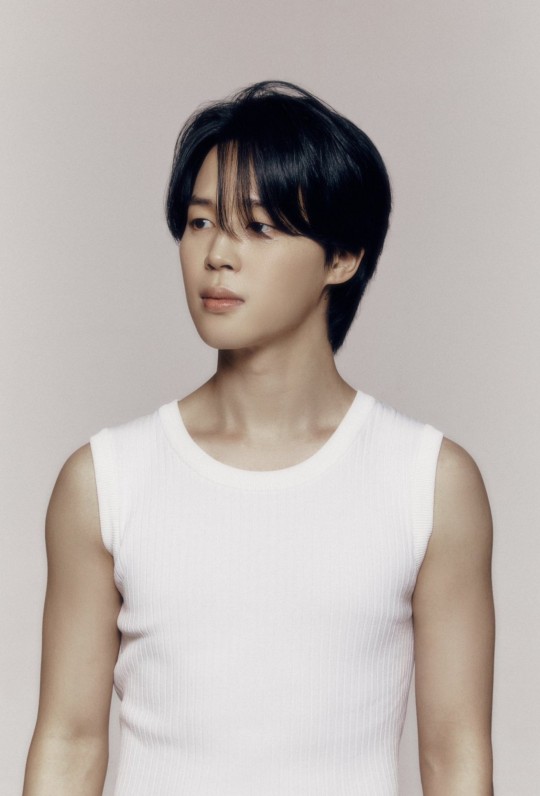
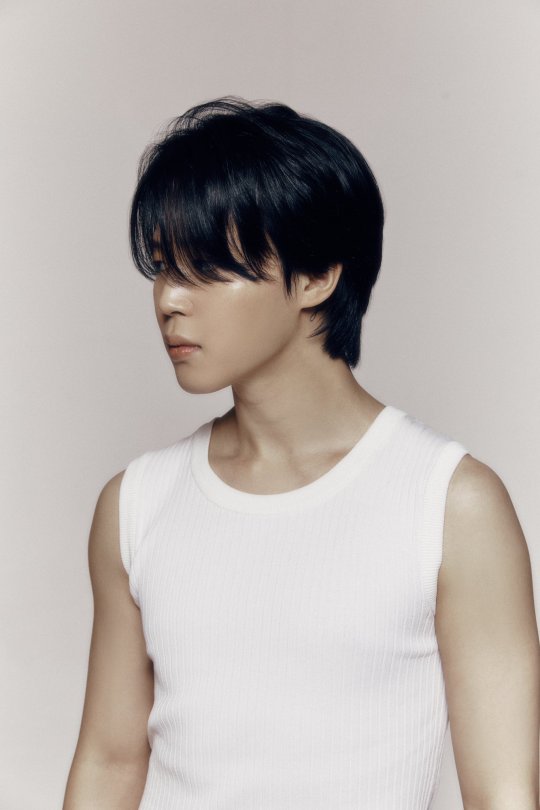
I'm talking about Tragedy as a literary and artistic genre.
Simply put, Tragedy as a genre is identified by pathos and passion. And the work must have a narrative structure - a beginning, a middle, and an end.
Pathos being the ability to identify with and pity a person going through hard times.
Passion referring to strong emotion (of any sort).
But how do we find the equivalent of that literary theory in work that's not a typical story? In a song, or in art?
In my opinion, we can see something similar in music if we combine literary theory and art theory. After all, what is a song but a story delivered with emotion through music, and experienced as art is?
There's a school of art theory called Aesthetic Emotionalism.
In a nutshell, this means that the VALUE of the artwork comes from the way it communicates or expresses emotion. Mood, colour, tone, language all contribute to the feelings we get when we experience that work, whether it's looking at a picture or listening to music. They help us pick up on the emotions the artist is conveying.
So what happens when you experience those emotions through art? What is catharsis?
The experience of tragic events in art, whether it's a heart-rending drama, or a beautiful sad song, or a dark and menacing painting, can give you access to emotions like fear, pity, and regret. Feeling those emotions through art lets you purge the heaviness of them from your mind and body, giving you a sense of relief. That's catharsis.
It seems counter-intuitive but ultimately the experience is uplifting. It's like having the benefits of a therapy session, but without having to face YOUR OWN demons.
Becuase of the narrative structure, and the resolution of conflict, there's always relief at the end of the story.
You feel cleansed of those strong emotions, reengergised and ready to go on. But you also feel a sense of calm understanding. The pathos part of the tragedy gives you insight into the suffering of the character in the story.
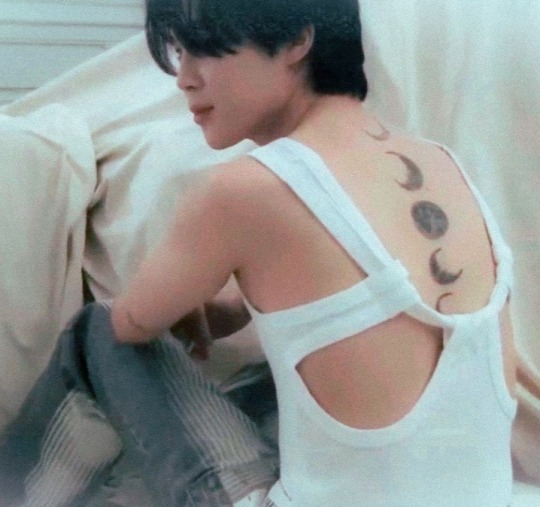
Think about the narrative structure of the album Face.
The album has a carefully planned narrative, and a sense of rising and falling energy with these songs that's strongly reminiscent of the structure of a Hero's Journey.
And think about the individual songs in terms of Aesthetic Emotionalism too ...how they convey emotions through tone, pace, language, colour etc.
I'm going to go ahead and say that the strength of the Aesthetic Emotionalism in these songs (and in BTS's music in general) is a major reason they have such impact even when you dont understand the lyrics.
Now let's combine them... look at the emotions conveyed in these songs and how the literary theory of a tragedy might apply to the album :
The first song is the slow and devastating Face Off, with its hypnotic rhythm and strange, discomforting sound effects. It reallly does transport us into a dreamlike/nightmare landscape. But the last few words of the song foreshadow that it's gonna be alright.
Then we have the surreal, melancholy Dive, drawing us further into this dystopian world. It also uses sound effects to make us feel like we are being pulled through time. Dive is reminiscent of a soundtrack from a video, but it's been separated from it's film reel, leaving the listener to guess and imagine the scenes unfolding. It feels like jimin has come untethered from his reality.
Like Crazy comes like rising action in a novel, and we get character development, a bit of plot information, and conflict. But the song itself is a viby dance track with a party atmosphere (if you don't look too closely) so we get a reprieve from the darkness of Face Off and Dive. Its hypnotic beat is enough to keep us locked in the surreal dreamlike world that's been built around us by the previous songs, and the lyrics echo that.
Alone takes us back down into the darkness of Jimin's state of mind, both lyrically and with its low tones and slow pace. We get the metronome, the marking of slow time.
Set Me Free has a totally different energy. Jimin's tone of of voice is much brighter, but hard and determined. Set Me Free isnt a request, it's a demand. The music is forceful. It's like a battle march. The story has reached its climax.
Returning to Like Crazy (English version) after Set Me Free, is like returning to a gentle refrain. Its so much softer and more plaintive than the demanding Set Me Free, echoing the earlier melody and words, but it hits sightly different in English. We are into the denouement of this story, the resolution has come.
But it's not the end.
It is not the end, because after a few minutes of silence, time to breathe, we get Letter.
Why is letter here?
Jimin could have released Letter on Weverse or Soundcloud or directly onto Spotify. But he chose to include it at the end of the album.
I feel this is so important, because the specific set of circumstances of this album means this Tragedy we've just experienced isn't entirely consistent with the literary genre.
FACE ticks all the boxes for a Tragedy in the literary sense, it has pathos and passion and narrative structure. If you were a casual listener and you got to the end of the album you would have a sense of catharsis, as intended. But there's a complication.
ARMY aren't casual listeners.
This is personal.
We know Park Jimin, the real person.
We know this isn't fiction. This shit is real. It was real for him when he wrote it and it's real for us now.
Achieving catharsis isn't that easy when it's personal. Not when the hurt is real.
That's why he gave us letter.
That's why he gave it ONLY TO US.
Letter is a soft sweet gift, a sentimental dedication full of reminiscences that only ARMY will understand. The melody is gentle, like a lullaby, and Jungkook's backup vocals are enough to make you weep, if you aren't weeping already.
(**I have a theory that jk either didn't know about letter or didn't know Jimin was going to ask him to sing. See this post for why)
Letter does exactly what it's meant to - it fills us with warmth. It makes us overflow with love. It's a soothing balm to heal our hearts.
And its everything we need in order to let go of those heavy feelings of fear and pity, of worry and sadness for Jimin that the album brought to the fore.

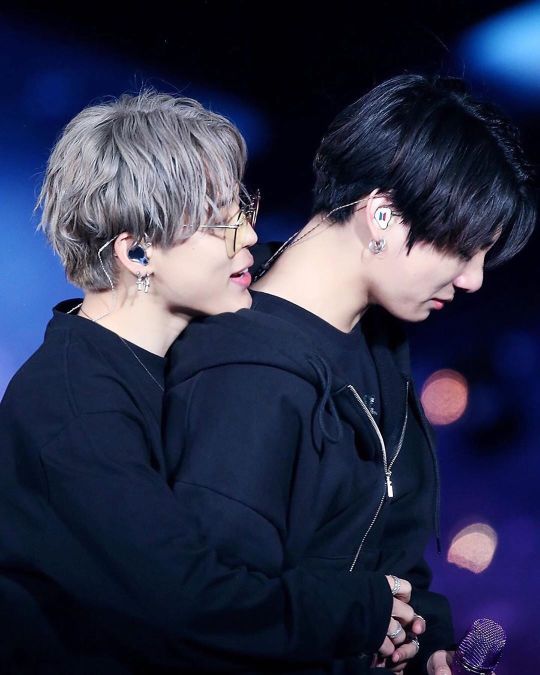
Jimin knew we would need more. That's why he he sent us letter, right at the very end.
"I'm sorry. Thank you," It says.
"Don't cry. It's gonna be alright."
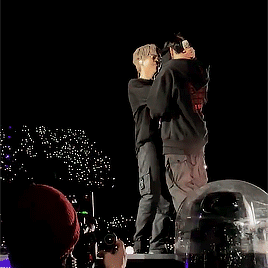
#park jimin#jeon jungguk#jikook#jimin face#park jimin face#park jimin letter#letter for army#pathos#plato#tragedy#aesthetic emotion#art theory#literary theory#bts#bts Jimin
156 notes
·
View notes